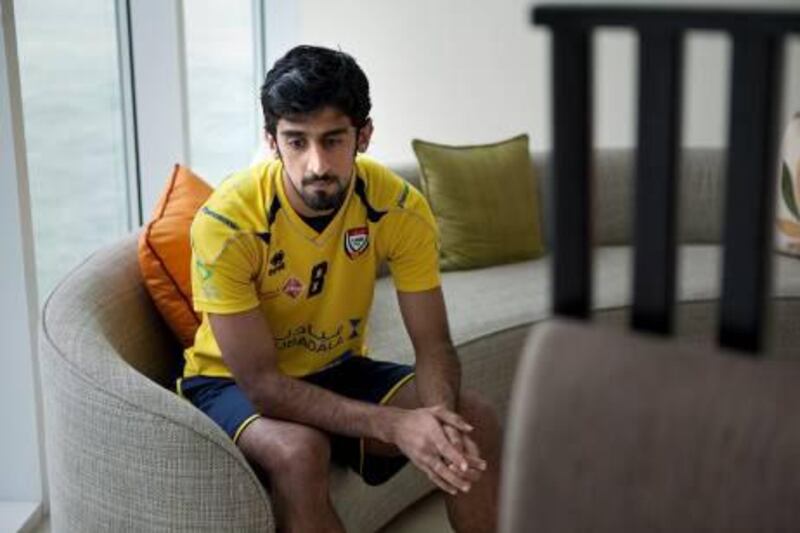ABU DHABI // As a teenager, Hamdan Al Kamali would have made an unlikely ambassador for road safety. It was not unusual for him to drive at speeds of 180 kph to help friends in a hurry.
But everything changed in 2011 with the death of his lifelong best friend, one of the country's finest footballers, Theyab Awana.
Awana, a star winger for Baniyas and a UAE international, crashed into a parked lorry while driving and texting at the same time. He was 21. It brought home for Al Kamali that a road death is not only about the victim. It is also about those left behind.
Al Kamali is the face of the Ministry of Interior's "Safest Driver" competition that was launched last week by Abu Dhabi Police. It is part of a strategy to reduce road deaths by 4 per cent annually. Participants can register online for the competition that will reward drivers with clean records this year.
Al Kamali's message is simple: if young people are not concerned about themselves, they should at least care for others. "You must think about your family and your friends and the country, because the country, it needs you," he said. "It's not for yourself, it is for your family and your country. Don't think about yourself. Think about your family first, your mother and father, your best friends."
The campaign targets young people aged 18 to 25. Al Kamali, 23, is in the age group that is more than twice as likely, on average, to die in road crashes as other road users in Abu Dhabi. The number of Abu Dhabi road deaths in this age group increased from 30.38 per 100,000 to 34.56 between 2010 and 2011.
Young people see driving as a symbol of independence, strength and power but police hope that the words of an admired young football star will have an impact.
"Young drivers need to follow traffic roads," said Dr Atef Garib, a traffic expert with Abu Dhabi police. "You are a very important asset for the country. Save your lives and save others' lives."
Awana and Al Kamali were childhood friends who played football together at school and in the streets of Baniyas. At football camp they slept together like brothers.
When they grew up they played on opposing teams - Awana was with Baniyas and Al Kamali is a defender with Al Wahda, but they came together to play for the national side.
The night Awana crashed, he was driving Al Kamali's car. When Al Kamali heard the news, he was in disbelief.
The two had spoken on the phone moments before. Awana was driving to Al Kamali's house.
Monday marks 18 months since Awana died. For Al Kamali, Fridays are no longer just spent socialising or training. Often, they are spent at the Baniyas graveyard where Awana is buried.
Al Kamali has become one of the country's biggest advocates of safe driving. He does not just keep Awana in his prayers. He travels the country to talk about reckless driving and what it means to lose a loved one.
The reminder is necessary.
On the anniversary of Awana's death, the head of the Dubai Police Traffic department said the problem of texting and driving had grown worse, not better.
Major General Mohammed Saif Al Zaffein called it a "ticking bomb" that was "worse than smoking" - addictive, contagious and deadly.
Participants can register for the campaign on Twitter, YouTube and at Uae-together.com/together2013/






